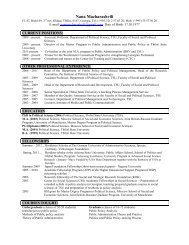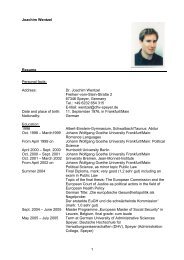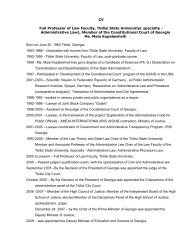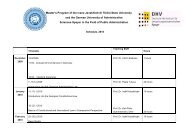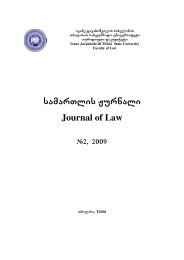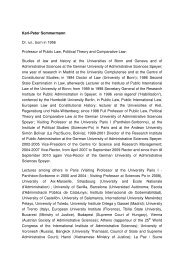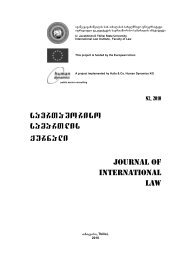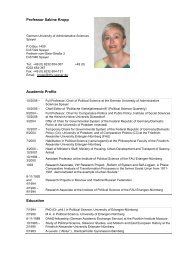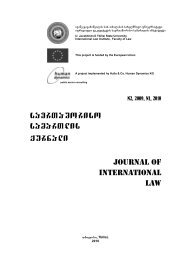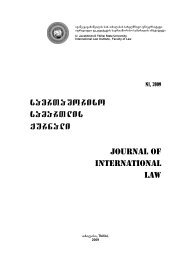Untitled
Untitled
Untitled
You also want an ePaper? Increase the reach of your titles
YUMPU automatically turns print PDFs into web optimized ePapers that Google loves.
saerTaSoriso samarTlis Jurnali, #1, 2008 JOURNAL OF INTERNATIONAL LAW, N1, 2008<br />
human dignity and fundamental HR of detained<br />
juveniles.<br />
The UN Rules for the Protection of Juveniles<br />
Deprived of their Liberty set forth a comprehensive<br />
approach to the rehabilitation of<br />
juvenile offenders, inspired by the Convention<br />
on the Rights of the Child. Some of the main<br />
principles are:<br />
• Facilities should be decentralized, to prevent<br />
juveniles from being detained far from<br />
their families and communities, and small<br />
enough to allow for individualized attention.<br />
• The system should include open or semiopen<br />
facilities, to meet the needs of children<br />
who require a residential setting but<br />
do not pose a serious danger to the community.<br />
• Treatment should begin with an evaluation<br />
of the needs of the individual, and<br />
should include appropriate forms of education,<br />
work, spiritual and psychosocial counselling,<br />
recreation and care of medical<br />
problems, including drug or alcohol dependency.<br />
• Respect for the rights of the child is essential<br />
to rehabilitation, because it encourages<br />
respect for the rights of others.<br />
According to the JDs detention before<br />
trial shall be avoided to the extent possible;<br />
all efforts should be made to apply alternative<br />
measures; if preventive detention is used, priority<br />
should be on a speedy trial to ensure<br />
the short detention periods; juveniles in pretrial<br />
detention should be presumed innocent;<br />
they should have the right to free legal aid<br />
and communicate with their counsels; they<br />
should have a chance to pursue work (with<br />
remuneration), education or vocational training<br />
and to receive and retain materials for their<br />
leisure and recreation.<br />
Concerning Management of juvenile<br />
facilities JDs states, that juveniles should<br />
not be detained without a valid commitment<br />
order ; individual record file should be established<br />
for each juvenile which should be confidential,<br />
however information from the file<br />
should be contestable by juvenile concerned.<br />
Juveniles should be separated from adults<br />
unless they are members of the same family<br />
Deprivation of liberty should only be in<br />
facilities which meat all the requirements of<br />
health and human dignity. Sleeping accommodation<br />
should consist of small group dormitories<br />
or individual bedrooms; sanitary installations<br />
should be sufficient and suitable for physical<br />
needs and privacy; the possession of personal<br />
clothing and effects should be allowed; clothing<br />
should be suitable for the climate and adequate<br />
to ensure good health; food should be<br />
suitably prepared and presented at normal<br />
meal times; clean drinking water should be<br />
available, preventive and remedial medical<br />
care should be adequate; education should<br />
take place in community schools and juveniles<br />
should have access to appropriate educational<br />
programs, library and vocational training. At<br />
the same time, juveniles should have the opportunity<br />
to work and receive an equitable remuneration.<br />
Recreation activities as well as practice<br />
of one’s religion shall be allowed supported;<br />
Juveniles should have adequate communication<br />
with the outside world, including but<br />
not limited to family members and friends; juveniles<br />
should be permitted to leave the facilities<br />
for visits to their family homes or for educational,<br />
vocational or other important reasons;<br />
they should also have the right to receive regular<br />
and frequent visits, the right to communicate<br />
in writing or by phone and the opportunity<br />
to keep themselves informed regularly of<br />
the news.<br />
Recourse or physical restraint or the use<br />
of force should be limited to exceptional cases<br />
and only as explicitly authorized by law or<br />
regulation; even then they should not cause<br />
humiliation or degradation and be used only<br />
for the shortest possible time; carrying of weapons<br />
by personnel should be prohibited; Regular<br />
inspections should be conducted by qualified<br />
independent inspectors and each inspection<br />
should finish with a report; facts indicating<br />
a violation of rights of juveniles or operation<br />
of a detention facility should be communicated<br />
to competent authorities.<br />
JDs also sets rules for disciplinary proceedings<br />
and rules for complaints by juveniles.<br />
Un Resolution 1997/30 Administration<br />
of Juvenile Justice: The Vienna Guidelines<br />
(1997). This program of action provides<br />
a comprehensive set of measures aimed at<br />
establishing a well-functioning system of juvenile<br />
justice administration according to the<br />
CRC, Beijing Rules, Riyadh Guidelines and<br />
JDLs and promoting effective use and application<br />
of these int’l standards. The topic of<br />
child victims and witnesses is given a special<br />
consideration.<br />
170



